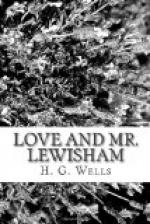“No, it shall not be!” he said, “it shall not be!”
But how to get back to the old footing? how to efface the things he had said, the things that had been done?
Could they get back?
For a moment he faced a new possibility. Suppose they could not get back! Suppose the mischief was done! Suppose that when he slammed the door behind him it locked, and was locked against him for ever!
“But we must!” said Lewisham, “we must!”
He perceived clearly that this was no business of reasoned apologies. He must begin again, he must get back to emotion, he must thrust back the overwhelming pressure of everyday stresses and necessities that was crushing all the warmth and colour from their lives. But how? How?
He must make love to her again. But how to begin—how to mark the change? There had been making-up before, sullen concessions and treaties. But this was different. He tried to imagine something he might say, some appeal that he might make. Everything he thought of was cold and hard, or pitiful and undignified, or theatrical and foolish. Suppose the door was closed! If already it was too late! In every direction he was confronted by the bristling memories of harsh things. He had a glimpse of how he must have changed in her eyes, and things became intolerable for him. For now he was assured he loved her still with all his heart.
And suddenly came a florist’s window, and in the centre of it a glorious heap of roses.
They caught his eye before they caught his mind. He saw white roses, virginal white, roses of cream and pink and crimson, the tints of flesh and pearl, rich, a mass of scented colour, visible odours, and in the midst of them a note of sullen red. It was as it were the very colour of his emotion. He stopped abruptly. He turned back to the window and stared frankly. It was gorgeous, he saw, but why so particularly did it appeal to him?
Then he perceived as though it was altogether self-evident what he had to do. This was what he wanted. This was the note he had to strike. Among other things because it would repudiate the accursed worship of pinching self-restraint that was one of the incessant stresses between them. They would come to her with a pure unexpectedness, they would flame upon her.
Then, after the roses, he would return.
Suddenly the grey trouble passed from his mind; he saw the world full of colour again. He saw the scene he desired bright and clear, saw Ethel no longer bitter and weeping, but glad as once she had always seemed glad. His heart-beats quickened. It was giving had been needed, and he would give.
Some weak voice of indiscreet discretion squeaked and vanished. He had, he knew, a sovereign in his pocket. He went in.
He found himself in front of a formidable young lady in black, and unprepared with any formula. He had never bought flowers before. He looked about him for an inspiration. He pointed at the roses. “I want those roses,” he said....




